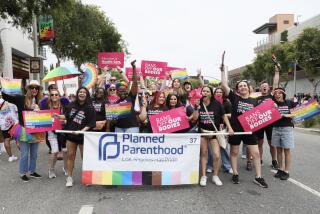Planned Parenthood launches breast cancer initiative
- Share via
Planned Parenthood has launched a $3-million package of breast health programs designed to identify women at elevated risk of breast cancer, increase access to specialty healthcare for women with apparent breast abnormalities, and expand a breast health educational program aimed at Latinas.
The initiative is to be funded with money donated in the wake of the Susan G. Komen Foundation’s decision to withdraw its support for the organization -- a step that was reversed after it ignited a firestorm of controversy in February.
Komen’s decision to end its breast health partnership with Planned Parenthood -- widely seen as a response to political pressure from socially conservative donors -- spurred a three-day “outpouring” of donations to Planned Parenthood amounting to $3 million, said Cecile Richards, president of the Planned Parenthood Federation of America. The current Planned Parenthood initiative uses those donations to expand breast health programs beyond those reinstated by the Komen Foundation.
“We’re proud to be working with Komen again on our shared mission of protecting women’s health and beating breast cancer,” Richards said.
Planned Parenthood provides reproductive and general healthcare to about 3 million American women annually, 90% of them between the ages of 19 and 39. Though breast cancer is rare in that stage of life, it can be highly aggressive, and early detection is widely believed to increase the chance of survival.
The new programs will fund grants to healthcare centers that provide biopsies, ultrasounds and other diagnostic care to women who have had a suspicious finding on a screening mammogram. The cost of such follow-up services -- and women’s fear -- prompts many of Planned Parenthood’s patients to forgo such follow-ups, said Dr. Deborah Nucatola, senior director of medical services for the Planned Parenthood Federation of America.
The organization will also expand its outreach to Latinas with a program of promotores -- specially trained workers who work within the Spanish-speaking and immigrant communities to educate women about breast health and draw them into clinics for cancer screenings and follow-up care.
Finally, Planned Parenthood’s initiative will make widely available a breast cancer risk-assessment tool that will help physicians identify women at higher risk of developing breast cancer. Such women could be steered toward enhanced screening services and genetic testing and counseling if appropriate.
A key partner in the new initiative is the Lance Armstrong Foundation, which will connect women diagnosed with breast cancer to free bilingual services to help them navigate the maze of treatment, payment and logistical decisions they face.
In designing its programs, Planned Parenthood hewed to cancer screening recommendations embraced by the American College of Obstetricians and Gynecologists rather than those put forth by the U.S. Preventive Services Task Force in 2009. Dr. Nucatola said Planned Parenthood decided that the ACOG’s recommendations, which call for yearly mammogram screening for virtually all women after 40, “better serve our patients.”
More to Read
Sign up for Essential California
The most important California stories and recommendations in your inbox every morning.
You may occasionally receive promotional content from the Los Angeles Times.











